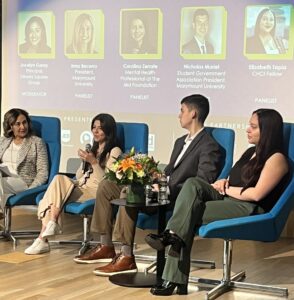Cyberbullying Resources for Parents and Caregivers
As caring and supportive adults, we aspire to guide youth toward becoming compassionate, understanding, and resilient individuals. In a world where social and emotional challenges ...

By Lauren Patetta
Feeling connected to community is critical to mental health and can significantly reduce suicide risk. Seize the Awkward—a campaign created by The Jed Foundation (JED) and the American Foundation for Suicide Prevention (AFSP), in collaboration with the Ad Council—fosters connection among teens and young adults by encouraging them to talk about mental health.
Seize the Awkward hosted two panels in recent weeks to bring attention to the mental health challenges prevalent among students of Hispanic and Latin American descent.
“One of the things that I’ve noticed is that young people really want to support each other,” said Laura Erickson-Schroth, MD, MA, Chief Medical Officer at JED, at the event. “The thing that gets in the way is the ‘hows.’ How to recognize that someone you know is in distress, how to start conversations, how to respond to someone that may reach out to you. That’s why we have things like Seize the Awkward. It’s all about being equipped and knowing how to respond and being there for someone.”
According to the 2021 Youth Risk Behavior Survey from the Centers of Disease Control and Prevention (CDC), Hispanic and multiracial high school students were more likely to deal with persistent feelings of sadness or hopelessness than Asian, Black, or white students. Forty-one percent of Hispanic college students struggled with depression in 2020, but they are less likely to receive mental health care than their white peers and may struggle to find culturally competent care.
By bringing together influencers, subject matter experts, and community leaders, both events provided students with tools for starting difficult conversations with their friends and peers, emphasizing Seize the Awkward’s mission.
Let’s Be Real, Conectémonos (Let’s Connect)
For Let’s Be Real, Conectémonos, Seize the Awkward partnered with the United States Hispanic Leadership Institute (USHLI), as well as Poderistas, a digital community that empowers Latinas to amplify their voices and connect with each other online.
In a virtual discussion hosted by Poderistas on Instagram and moderated by Poderista Co-Founder Elsa Collins, the panel featured insights from top beauty influencer Amanda Diaz; AFSP Research Grantee Kiara Alvarez, PhD; and USHLI Scholar Dulce Diaz. Together, they encouraged young audience members to “be the friend who listens.”
Buenos Pues…Hablemos (Well Then…Let’s Talk)
The second event, hosted onsite at Marymount University, built on the “listening” theme introduced during the first panel by providing students with tips and tools for initiating their own conversations with friends about mental health.
Dr. Erickson-Schroth was joined by Jocelyn Garay, Principal of Dewey Square Group and an alumna of Marymount; Dr. Irma Becerra, President of Marymount; Carolina Zerrate, MD, JED Expert and Child and Adolescent Psychiatrist; Nicholas Mariel, Student Government Association President at Marymount; and Elizabeth Tapia, Congressional Hispanic Caucus Institute Fellow.
The panelists shared the biggest factors affecting the well-being of Hispanic and Latiné students, from the familiar stressors of academic performance and online bullying to more culturally sensitive issues related to being a first-generation student or dealing with stigma surrounding mental health. Their advice gave students new ways to connect with each other through reaching out for help or trying to support a friend.
When students feel supported in having open conversations about mental health, they move one step closer to emotional well-being. To learn more about Seize the Awkward and how to start life-changing conversations, visit SeizeTheAwkward or follow @SeizeTheAwkward on Instagram.
If you or someone you know needs to talk to someone right now, text, call, or chat 988 for a free confidential conversation with a trained counselor 24/7.
You can also contact the Crisis Text Line by texting HOME to 741-741.
If this is a medical emergency or if there is immediate danger of harm, call 911 and explain that you need support for a mental health crisis.